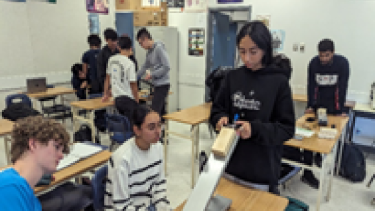
News From the Nest-Spotlight on Learning: Incline Plane Lab
Spotlight On Learning
Extension Project: Incline Plane Lab: Theory to Practice
Presented by: Oreste Rimaldi
Subject: Physics 12
TEACHER DESCRIPTION and/or REFLECTION:
This was their second formal lab in physics 12. Students where tasked with determining the coefficient of static friction and kinetic friction for 3 different objects. I described what they needed to achieve and did a quick demo using the apparatus that they would need to use. The students had to come up with their own procedure. As well they students needed to figure out what data they need to collect and how to organize that data as well as what calculations they needed. The write up of the lab had to be clear enough that they could hand it to another student and that student would be able to perform the lab and meet the objectives of the lab without needing to ask for any further questions. There are always many hiccups to this lab. Students do not write a thorough enough lab procedure, or they do not organize their data in an efficient manner or in an easy-to-follow manner. Giving proper diagrams of the procedure was not done very well. Organizing their data in an easy way to determine the results and if they results were easy to compare between static and kinetic coefficients of friction was done, for the most part, poorly. The calculations were for the most part, organized well, and calculated correctly (the theory). Overall, I was surprised at how poor their skills were in how to write up a procedure and general organizing of data and not knowing what data they needed to collect. In the past, students were quite good at these skills. These are all things that I will try to emphasize more in the future. Maybe this was just a hiccup for this year.
STUDENT REFLECTIONS:
- Critical and reflecting thinking strengths: I think that I am really good at…
- Solving problems on my own then.
- Troubleshooting the setup of the lab when things are not going as planned.
- Why experimental results are not same as theoretical expectations.
- Here are some specific examples of how I have shown my strengths in critical and reflective thinking:
- When I am stuck on a problem/equation, I find a different way to do it, then use that to figure out the next question for homework incline plane problems.
- When I calculated our results and they did not make sense with theory, I went back and realized that the block was not accelerating but moving at constant speed, so I increased the mass to make sure the block was accelerating.
- In the area, my goal for moving forward and improvement is:
- To think through the lab more thoroughly to know what data I need to collect.
- Organizing my tables of the data collected. After feedback, I realized how poorly my organization was.
- I think because I know what I meant for the procedure for the lab, I knew what to do, but when my lap partner read it, they did not know what to do, for the lab. I need to be more clear when writing out a procedure.
- To do this, I will challenge myself to:
- Ask for other students what they think of my procedure and data.
- Ask a friend who is not in physics to read my procedure and see if they understand it or could do it.